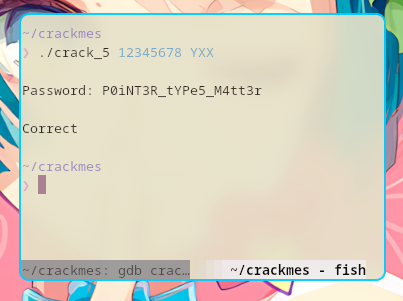Crack_5
- Author
-
0x42697262
- Play Date
-
2025/06/14 - 2025/06/14
Steps
file
I always start with file out of habit:
$ file crack_5 crack_5: ELF 64-bit LSB pie executable, x86-64, version 1 (SYSV), dynamically linked, interpreter /lib64/ld-linux-x86-64.so.2, BuildID[sha1]=1d57b761520e76af90103e540405284c7e8ffeee, for GNU/Linux 3.2.0, not stripped
Confirmed it’s a 64-bit ELF unstripped binary.
strings
Ran strings to look for hardcoded password:
$ strings Crackme-4 ... []A\A]A^A_ Sorry, That Is Wrong. Please Try Again. Password: Correct Sorry, That's Wrong... ;*3$" zPLR ...
No obvious password found.
Running
I ran the binary but all I got was terminated by signal SIGSEGV (Address boundary error).
Then I wondered if this challenge was meant to patch the binary. Or maybe it’s something that required arguments.
I tried running with 1 argument, I still got SIGSEGV. I then try with 2 arguments.
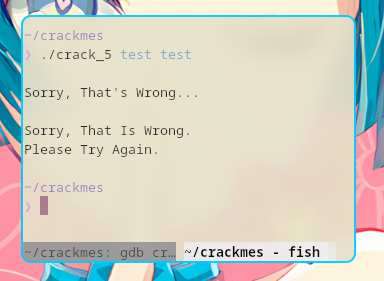
This looked promising. So I tried with 3 arguments, then 4, then 5, then so on and on… But the result is still the same.
I just need 2 arguments.
Disassembler
I opened Ghidra’s disassembler only to find out that the main function takes 2 parameters.
undefined4 main(undefined8 param_1,long param_2)Reading through the code, there were only two things that were important.
First, is the args() function that takes two parameters.
is_correct = args(*(char **)(param_2 + 8),*(char **)(param_2 + 16));Second, is the for loops of fake_password and coded_password.
I noticed that fake_password was not ever used in anything.
for (i = 0; i < 5; i = i + 1) {
decrypt((uint *)fake_password,5);
decrypt((uint *)coded_password,5);
}
for (j = 0; j < 7; j = j + 1) {
encrypt((uint *)coded_password,5);
decrypt((uint *)fake_password,5);
encrypt((uint *)fake_password,5);
}
for (k = 0; k < 1; k = k + 1) {
decrypt((uint *)fake_password,5);
decrypt((uint *)coded_password,5);
}| I have already renamed the labels in Ghidra, but the actual binary string labels are different. |
The value of is_correct must be set to `.
if (is_correct == '\x01') { ... }Hence, I need to figure out how args() function work.
What is args() function?
undefined8 args(char *param_1,char *param_2)
{
size_t temp;
basic_ostream *pbVar1;
undefined8 is_correct;
basic_string sorry_thats_wrong [39];
allocator<char> local_21;
int len_arg_2;
int len_arg_1;
...The first thing I have noticed is that the length of the two parameters were saved and checked.
temp = strlen(param_1);
len_arg_1 = (int)temp;
temp = strlen(param_2);
len_arg_2 = (int)temp;
if (len_arg_1 == 8) {
if (len_arg_2 == 8) {
...This is the overall conditional branch of the function.
if (len_arg_1 == 8) { (1)
if (len_arg_2 == 8) { (2)
pbVar1 = std::operator<<((basic_ostream *)std::cout,sorry_thats_wrong);
std::operator<<(pbVar1,'\n');
is_correct = 0;
}
else if (param_2[len_arg_2 - 2] == 'X') {
if (*param_2 < 'Y') {
pbVar1 = std::operator<<((basic_ostream *)std::cout,sorry_thats_wrong);
std::operator<<(pbVar1,'\n');
is_correct = 0;
}
else {
is_correct = 1;
}
}
else {
pbVar1 = std::operator<<((basic_ostream *)std::cout,sorry_thats_wrong);
std::operator<<(pbVar1,'\n');
is_correct = 0;
}
}
else {
/* try { // try from 0010181d to 001018cf has its CatchHandler @ 00101906 */
pbVar1 = std::operator<<((basic_ostream *)std::cout,sorry_thats_wrong);
std::operator<<(pbVar1,'\n');
is_correct = 0;
}| 1 | Returns incorrect if length of your first argument is not 8 |
| 2 | Returns incorrect if length of your first argument is exactly 8 |
If the length of the first argument where to be 8 characters, the code proceeds to check if the length of the second parameter is not equal to 8 characters.
This means, we need to have our first and second argument of the binary when executed be exactly 8 characters long and not 8 characters long, respectively.
There is another requirement, our second parameter must contain character X 4th index and the 1st index must be a character value greater than or equal Y.
if (param_2[len_arg_2 - 2] == 'X') {
if (*param_2 < 'Y') {
pbVar1 = std::operator<<((basic_ostream *)std::cout,sorry_thats_wrong);
std::operator<<(pbVar1,'\n');
is_correct = 0;
}
else {
is_correct = 1;
}
...
}These requirements are needed to return a value of 1.
return is_correct;At this point, I now know what I need:
-
The first argument of the binary must be 8 characters long regardless of the characters used.
-
The second argument of teh binary must have these conditions:
-
1st index must have integer value higher than
Y. -
4th index must exactly be character X.
-
With this, I came up with a new way to execute the binary: ./crack_5 12345678 Y00X0
Well, I can just use ./crack_5 12341234 YXX, a shorter version of the 2nd argument.
That is because if (param_2[len_arg_2 - 2] == 'X') checks if the index of (length - 2) is exactly X.
Running with the correct parameters
Here, I ran the binary with the correct parameters.
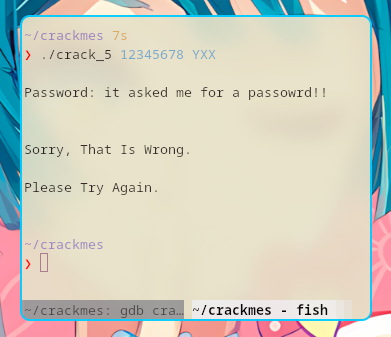
Now, I need to get the password.
That should not be a problem because there is a hint.
copy_string(coded_password,20,copied_password);
is_password_correct = std::operator!=(password,copied_password);Extracting the encrypted password
coded_password is stored in the .data section of the binary.
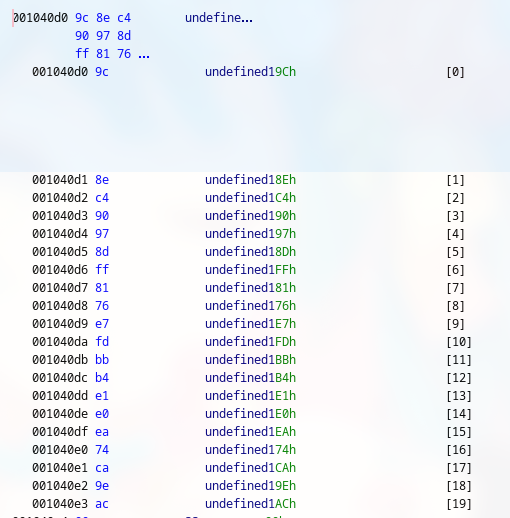
But how do we get the unencrypted password?
The easiest way is to use GDB!
Well, my other method was to decrypt it by rewriting the decrypt() function…
Although I had issues with that as it took me almost 4 hours to realize the size of "pointers" and variables.
GDB
I ran the binary with GDB and added a breakpoint somewhere around copy_string variable.
gef➤ disas /r main ... 0x0000555555555611 <+534>: 48 89 d6 mov rsi,rdx 0x0000555555555614 <+537>: 48 89 c7 mov rdi,rax 0x0000555555555617 <+540>: e8 a5 03 00 00 call 0x5555555559c1 <_ZStneIcSt11char_traitsIcESaIcEEbRKNSt7__cxx1112basic_stringIT_T0_T1_EESA_> ... gef➤ b *main+537 Breakpoint 1 at 0x555555555614
I ran the binary with its arguments and was able to find the decrypted string.

There we go, found the password.
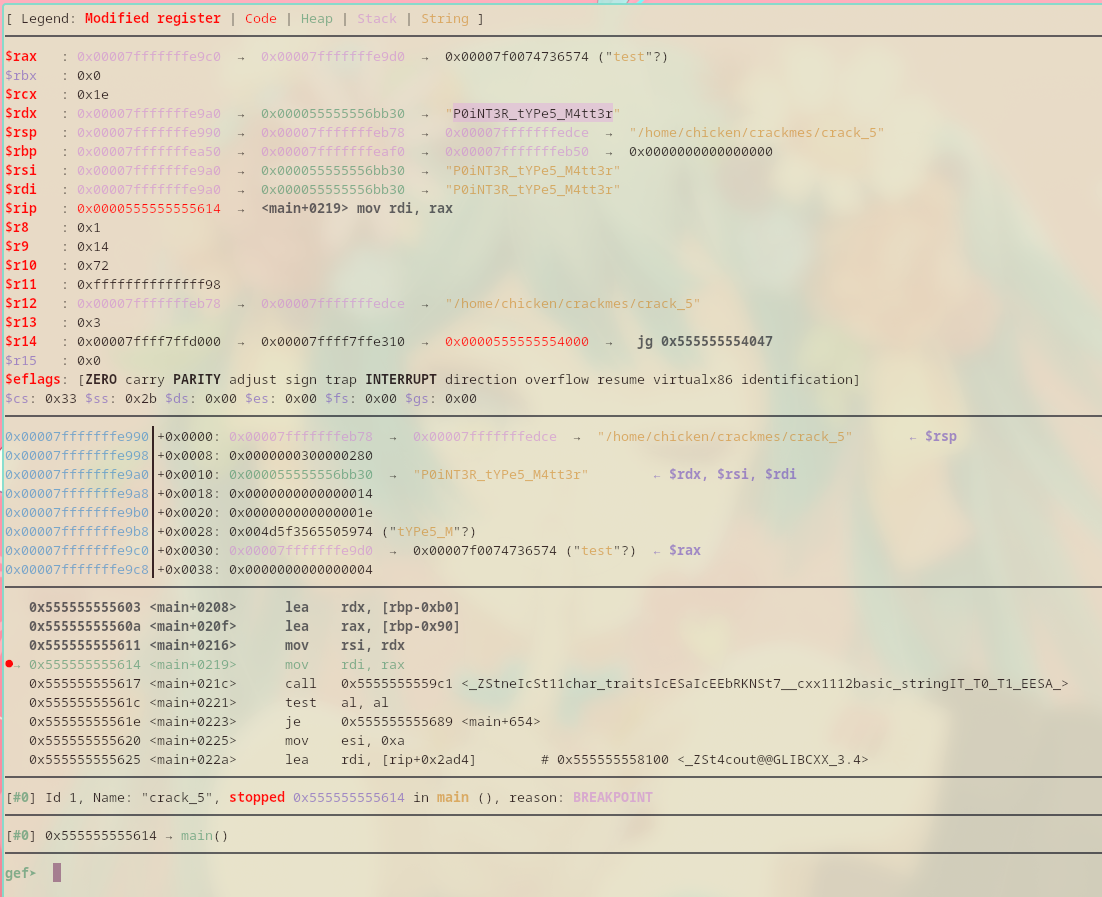
It’s P0iNT3R_tYPe5_M4tt3r!
Conclusion
This was a pretty easy challenge if you just used GDB directly like what I did above.
However, that’s not going deeper down the rabbit hole of reverse engineering.
As I have mentioned earlier, it took me almost 4 hours to use the alternative solution… Why that long? You’ll see below.
Manually decrypting the password
In the main funciton, decrypt((uint *)coded_password,5); was called 5, 7, and 1 times from the three loops.
This is what the decrypt function contains.
void decrypt(uint *string,uint count)
{
uint index;
for (index = 0; index < count; index = index + 1) {
string[(int)index] = index + string[(int)index];
string[(int)index] = string[(int)index] + 0x23;
string[(int)index] = string[(int)index] ^ 0xdeadbeef;
}
return;
}It takes an input unsigned pointer of an array and an unsigned integer.
The string is the coded_password passed by calling the decrypt() function.
It then tries to loop over the array at the limit of count.
Which is 5 called by the main() function.
Wait, why 5 when our coded_password is 20 characters long?
0x9c, 0x8e, 0xc4, 0x90, 0x97, 0x8d, 0xff, 0x81, 0x76, 0xe7, 0xfd, 0xbb, 0xb4, 0xe1, 0xe0, 0xea, 0x74, 0xca, 0x9e, 0xac
And it is stored as 1 byte in an array.
See the image below again for reference.

At first, I thought the loop will iterate over the array 1 byte at a time. And been trying to figure out why when the code below is already able to decrypt the password.
for (i = 0; i < 5; i = i + 1) {
decrypt((uint *)fake_password,5);
decrypt((uint *)coded_password,5);
}That’s where 3 to 4 hours worth of my time got wasted trying to figure out why the hell it gets decrypted properly.
At first I thought the memory doesn’t get cleared since decrypt function was called 5 times so index must have been running…
Which was wrong. My thought process was wrong.
There was already a big hint right in front of me: uint
An unsigned integer.
Well, other than that, there’s also string[(int)index] = index + string[(int)index];: (int)index.
What does this mean? Majority of the people would have already seen this as pretty obvious. Not for me.
Solution + Python script
The reason why it works is becuse accessing the index at a given pointer address of an array is by 4 bytes. Ahah!
So, what happens is that 4 bytes were decrypted each time the loop iterates.
0x9c8ec490 0x978dff81 0x76e7fdbb 0xb4e1e0ea 0x74ca9eac
Now that makes sense!
I asked ChatGPT to help me create a Python script to decrypt the password.
def decrypt(data, count):
"""
data: list of 32-bit unsigned integers (uint32)
count: number of uint32s to process
"""
for index in range(count):
data[index] = (index + data[index]) & 0xFFFFFFFF # simulate 32-bit overflow
data[index] = (data[index] + 0x23) & 0xFFFFFFFF
data[index] = (data[index] ^ 0xDEADBEEF) & 0xFFFFFFFF
def bytes_to_uint32_list(byte_data):
"""
Convert bytes (len multiple of 4) to list of uint32 values
"""
return [int.from_bytes(byte_data[i:i+4], 'little') for i in range(0, len(byte_data), 4)]
def uint32_list_to_bytes(uint_list):
return b''.join(x.to_bytes(4, 'little') for x in uint_list)
coded_password_bytes = bytes([
0x9c, 0x8e, 0xc4, 0x90, 0x97, 0x8d, 0xff, 0x81,
0x76, 0xe7, 0xfd, 0xbb, 0xb4, 0xe1, 0xe0, 0xea,
0x74, 0xca, 0x9e, 0xac
])
coded_password = bytes_to_uint32_list(coded_password_bytes)
# Process first 5 uint32s
decrypt(coded_password, 5)
# Show result
print("Decrypted uint32s:")
for val in coded_password:
print(f"{val:08x}")
# If you want to see it as bytes:
decrypted_bytes = uint32_list_to_bytes(coded_password)
print("Decrypted bytes:", decrypted_bytes)Running the script gave me the needed password of this challenge.
$ python crack_5.py Decrypted uint32s: 4e693050 5f523354 65505974 344d5f35 72337474 Decrypted bytes: b'P0iNT3R_tYPe5_M4tt3r'
UPDATE: August 26, 2025
I reran this challenge once again after two months. Only to find out I lacked deep understanding for C/C++.
Turns out, I could’ve just rewritten the function copied from Ghidra…
uint8_t coded_password[] = {
0x9c, 0x8e, 0xc4, 0x90,
0x97, 0x8d, 0xff, 0x81,
0x76, 0xe7, 0xfd, 0xbb,
0xb4, 0xe1, 0xe0, 0xea,
0x74, 0xca, 0x9e, 0xac
};or like this.
unsigned int coded_password[] = {
0x90c48e9c,
0x81ff8d97,
0xbbfde776,
0xeae0e1b4,
0xac9eca74
};What matters is the way I stored the raw-hex values from the binary.
Which is by using uint8_t or unsigned int. However, unsigned int must use the reverse of the 4-bytes in one integer due to the raw data being little-endian.
